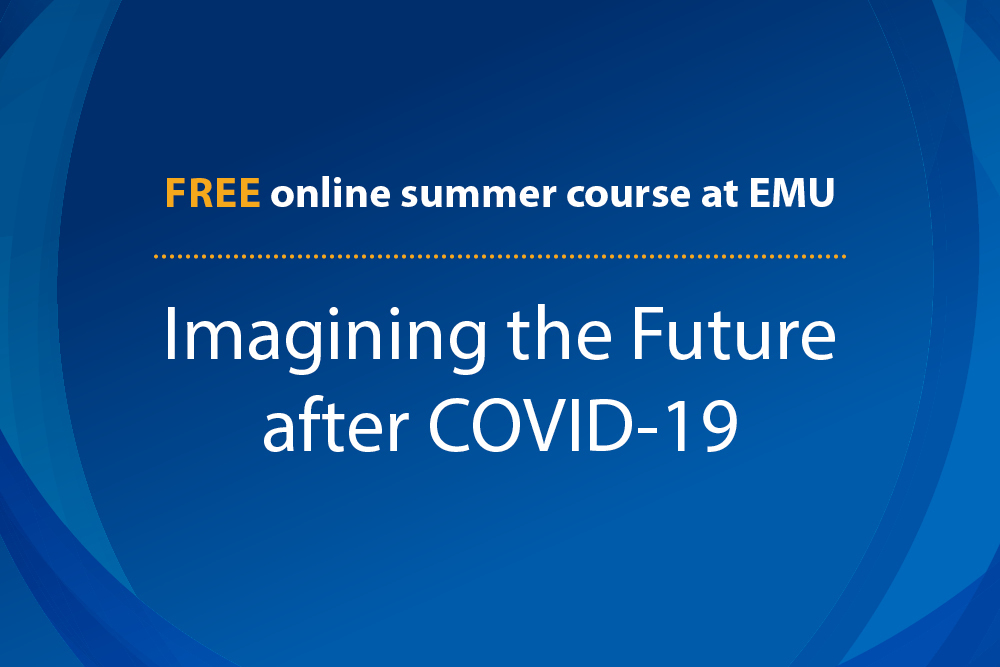What will a post-pandemic world look like? How is COVID-19 affecting each of us differently, and what are our responsibilities to one another in the face of those disparities? What do we know about the biology of the virus? And are there things that are changing for the better because of this crisis?
A free seven-week online course offered at Eastern Mennonite University this summer will delve into those questions and more. Community members are welcome. Students can opt for a pass/fail grade and will have online access to readings, videos, and other materials before each class.
The course meets each Tuesday evening, beginning June 30, from 6:30-8:30 p.m. for seven weeks, with a different pair or trio of faculty and staff from different academic fields leading each class.
The lectures and Q and A will be recorded and available for viewing later.
The course is co-led by language and literature professor Kevin Seidel and chemistry professor Laurie Yoder.
“What pulled me in at first was the possibility of teaching with faculty from all three schools – sciences, social sciences, and humanities – talking together and learning from one another about the virus,” Seidel said. When the pandemic hit, he started fervently gathering information and perspective: from scientists, from fictive literature, and from poetry, trying to make sense of “this strange new world.”
Week 1 | June 30, Tuesday, 6:30–8:30 p.m.
Treating COVID-19
What do we know about the biology of COVID-19? What’s next in vaccine development? What public health measures are working to slow the spread of COVID-19?
Kristopher Schmidt, Associate Professor of Biology
Kate Clark, Assistant Professor of Nursing
Week 2 | July 7, Tuesday, 6:30–8:30 p.m.
Pandemic History and Data
What can we learn from past pandemics about life after this one? What can we learn from visual presentations of data about the pandemic?
Mary Sprunger, Professor of History
Daniel Showalter, Associate Professor of Mathematics
Week 3 | July 14, Tuesday, 6:30–8:30 p.m.
Politics and Collective Trauma
Why has the U.S. response to COVID-19 been so contentious and uneven? What is collective trauma and what might it have to do with that response?
Mark Metzler Sawin, Professor of History
Ryan Thompson, Assistant Professor of Psychology
Trina Trotter Nussbaum, Associate Director, Center for Interfaith Engagement
Week 4 | July 21, Tuesday, 6:30–8:30 p.m.
Zoonotic Viruses, Wet Markets, and the Economics of COVID-19
Where do coronaviruses come from? What are the links between environmental degradation and pandemics? What does COVID-19 have to teach us about how our economy is connected to the natural world? What are the economic impacts from a pandemic?
Jim Yoder, Professor of Biology
Jim Leaman, Associate Professor of Business and Leadership
Week 5 | July 28, Tuesday, 6:30–8:30 p.m.
Our Life with Animals, Our Life with God
Why are so many people taking refuge in nature during the pandemic? Why is that refuge harder to come by for some people? What do the scriptures say about how our life with God is related to our life with animals?
Steven Johnson, Professor of Visual and Communication Arts
Andrea Saner, Associate Professor of Old Testament
Week 6 | August 4, Tuesday, 6:30–8:30 p.m.
Systemic Racism in the U.S. before and after COVID-19
Why has COVID-19 hit African-Americans harder than other groups? Why does rural Navajo Nation have the highest infection rates in the country?
Jenni Holsinger, Associate Professor of Sociology
Matt Tibbles, Teaching Fellow, Applied Social Sciences
Jim Yoder, Professor of Biology
Week 7 | August 11, Tuesday, 6:30–8:30 p.m.
Resilience, Repair, and Transformation after COVID-19
How do we carry forward what we’ve learned about COVID-19, trauma, and restorative justice?
Johonna Turner, Assistant Professor of Restorative Justice and Peacebuilding
Katie Mansfield, Lead Trainer, Strategies for Trauma Awareness and Resilience (STAR)

This will be an interesting course to take to help with understanding of the covid 19 pandemic and how the country will proceed in the future.
Is this all we have to do to register? Will the lectures be recorded also?
Yes, simply register and more information will be sent to you. The lectures will be recorded and available for viewing later as well.
Will look forward to this offering.